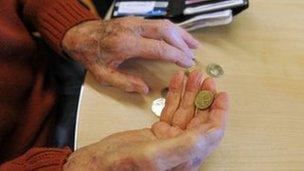Elderly care all sorted? Think again...
- Published

Many pensioners still face paying significant sums for old age care
When the government unveiled its plans for a £72,000 cap on elderly care costs from 2016, ministers were quick to claim they had solved the problem.
The era of huge bills for care, an issue which resulted in tens of thousands of people selling their own homes each year, was over, they said.
But as politicians and campaigners sift through detail it is becoming more and more clear that all is not quite as it seems.
Not everyone will be able to pick the tab up later
One of the measures trumpeted by ministers was the fact that the bill individuals face could be deferred by getting councils to pay for the care and then allowing them to recoup it from an individual's estate after their death.
This option is already available in some areas, but under the changes every council would have to offer it, they said.
But it has now emerged the option of deferring payments will not be open to wealthier people.
Only those needing residential care who have assets of less than £23,250 (excluding the value of their home) will be able to get their local council to pay the costs.
For example, it means someone with £50,000 in the bank when they enter a care home will have to pay the bills as they come in until that has been reduced to £23,250. Only then will they be able to defer the costs.
Labour peer Lord Lipsey believes this is such a significant loophole that it amounts to a "sabotaging" of the safeguards.
Hotel costs will rack up
The £72,000 cap will not include the amount an individual pays for the "hotel costs" of a care home - that is to say the normal cost of daily living such as food, energy bills and the accommodation.
Under the reforms, these so-called "hotel costs" will be set at £12,000 a year. For a typical care home place that accounts for about a third of the fees.
Therefore, it would mean that an individual could find themselves paying over £100,000 over three years (£72,000 in care fees and £36,000 in hotel costs) before the cap kicks in.
And once it does they will still be liable for the £12,000-a-year hotel costs until their wealth is whittled away.
The biggest losers - those with middle incomes
With any system, there is always winners and losers. In this case it is those in the middle.
The poorest will continue to get social care free as they do now.
But those with assets of over £118,000 (including the value of property) will be liable for care home costs until they reach the £72,000 cap or their assets fall below the £118,000-mark.
It means those with assets of between £150,000 and £200,000 face losing between a third and nearly a half of their in care costs.
That compares to 0% for people with below £17,000 and a sixth for those with £500,000. Those even wealthier than that lose even less.
Get ready for rows with your local council
It will be up to local authorities to calculate how much an individual has to pay. They will do this by working out the average they pay for care home places for those who get state help.
This will stop people moving into a luxury care home and racking up £72,000 in costs in super quick time.
Fair enough, you might say.
But the problem - recognised by the Health Select Committee earlier this year - is that councils, with the benefit of buying places in bulk, can often negotiate lower fees than an individual can.
This could lead to disputes over what the true costs are.
Most people will never reach the cap
The original proposals suggested setting the cap at a much lower level. But in the end ministers came up with the figure of £72,000.
This was not plucked out of thin air.
Once a person enters a care home, not many live beyond two years.
In that time just those requiring the most intensive care are ever likely to accrue bills in excess of £72,000.
It means only an estimated one in eight people will benefit from the cap, according to estimates by the government.
And that is why Age UK, which has been campaigning for years for reform of the social care funding system, sees the cap as only a start.
It argues the cap only benefits those with "the greatest needs" who end up in care homes "for a considerable amount of time".